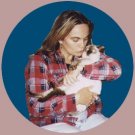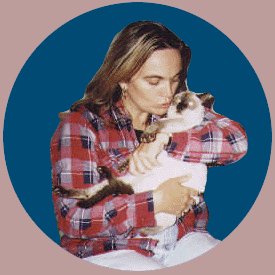SEVEN AUSTRALIAN POETS
Dorothy Porter interviewed by John Kinsella

[Above] Dorothy Porter and Emma by Andrea Goldsmith, 1996.
JK: You seem to have approached the individual poem in terms of a "book" from the earliest days of your writing. Is this in fact the case?
DP: Not really. In my earliest days as a writer I was very much influenced by the romantic image of the poet, hence I waited for inspiration to strike like the proverbial lightning. This idea is not congenial with shaping poems in terms of "a book". I had nothing like that kind of discipline - or ambition. But I have always been interested in narrative poetry and exploring characters and extreme scenarios through poetry. Recently re-reading my first collection LITTLE HOODLUM I realised how much I was influenced by the dramatic monologues of Browning and Eliot, and how often the voice of my own early monologues was male. These poems tended to be my longest, but until I wrote AKHENATEN I had no intention of stretching one of them into a book length verse narrative. I didn't even know if it were possible.
JK: The success of The Monkey's Mask has led to your being associated with the contemporary verse novel. But a work like Akhenaten, a complex and long verse sequence, might hold the key to your voice and technique?
DP: I agree. AKHENATEN broke the real ground for me. I remember - sometimes nostalgically - how little I had to lose when I wrote it, and as painful as it felt at the time, that proved liberating. The voice, although an historical male voice, was an amazingly fertile one. It was both elusive and fraught with androgynous possibility. There was a story to give me structure but with enough holes in it not to strangle me. AKHENATEN taught me patience - the book took four years to write - and to allow inspiration in its most feisty romantic sense to play with/on me. The poems were written totally out of sequence and I had to wait for them. I used music. I used research, my eyes and my nervous system. I glutted myself on poetry. I still trust this approach.
JK: Are you a big reader of genre fiction?
DP: Yes. It's long intrigued me how many poets are serious crime fiction buffs. The most lofty of the modernist poets were virtual detective fiction addicts - Eliot and Yeats come to mind. Auden of course adored the genre. Is it because poets veg out when they read prose? Or is it because genre fiction and poetry have some fundamentals in common? Whenever I read Raymond Chandler (a poete manque) I'm reminded of the Theseus myth - the image of the loner in the dark labyrinth grasping at the black wall for Ariadne's thread while looking out for the Minotaur. These are potent poetic images, especially the Minotaur - surely a representation of active evil and the hero's own mortal limitations and terror. What better base line narrative for poetry! What seeds!
JK: In your statement in Landbridge you said: I'm dismayed at how unpopular and marginalised poetry, at least in the English-speaking world, has become". You go on to say, "I have also enjoyed throwing down the gauntlet and challenging the absurd idea that prose invited fiction". Could you elaborate?
DP: Fiction is basically a fancy word for story telling. Making things up. And all poets are magnificent liars. Do you believe Homer? It's said the devil has the best tunes. Why have poets abdicated in the last hundred years or so (really post Tennyson) the fiction realm to prose writers? Poetry is also the cat skinned an infinite number of ways. It will be fascinating to see what happens to fiction in the hands of poets. I predict - as has George Steiner - the rise and dominance of myriad forms of narrative and dramatic poetry.
JK: Is all poetry performance of one kind or another?
DP: Each poem - that works - has a sense of the virtuoso. And let's face it so few poems DO work. That's why a good poem is as much a feat as a concerto or an Oscar-winning performance. Every good poem also carries a profound acoustic vibration. No matter who writes it. No matter how silently delivered.
JK: Your work is overtly political on many levels, dealing with issues of gender, "class", animal welfare, etc. Of course, I use these expressions cautiously. Will you continue to write "political" poetry?
DP: Via your examples and definition. Of course. It's unavoidable. Though Pasternak had a good point when he warned against public poetry and advised the "official" seat of poet remain empty. I trust my work will always get up a few noses. Though Christ knows what difference it makes (I'm echoing Auden's stoical reminder that poetry makes nothing happen). Does John Howard read poetry?
JK: Is all poetry political, regardless of intent?
DP: I'm not sure. Is a tepidly passive badly written poem an unintentional gesture of support for the bankrupt and morally debilitating policies of our current Liberal government?
JK: Many reviewers comment on your "subcultural" appeal. Do you see this as an attempt to package and compartmentalise you?
DP: I'm delighted to have appeal to anyone at all. Audiences are very precious to a poet. I try to resist the "lesbian" poet label - or the "erotic" poet label (just shows how "dry" poetry has become to many readers). These labels can be veiled put downs especially from conservative male reviewers. And alas much poetry reviewing in Australia is still very much dominated by a doggedly reactionary and highly territorial masculine discourse.
JK: What are you reading at the moment?
DP: Astronomy books (mind-boggling research for my next book). In poetry Montale, Dante, John Ashberry, Jennifer Maiden and Akhmatova.
JK: Was Elizabeth Barrett Browning an influence?
DP: Should she be? Less so than Dickinson, HD or Bishop. I liked her verse novel AURORA LEIGH.
JK: And what of the general failure of anthologists in Australia to recognise the strength of women's poetry over the last century?
DP: Poetry is still a straight boys' game in Australia. A cross between a stuffy gentlemen's club and a savage groin kicking game of footy. Not good for women and certainly not good for gay men. One of the best poets of the last few years has been David Herkt - miles too ferally queer and dangerous to be allowed to join the game.
JK: Do you see Crete as an "in between" book? That is, a book between verse novels? Or is it a kind of verse novel/ sequential work itself?
DP: The only "in between" books I have written were prose novels for kids. CRETE, in my view, is one of my strongest books of poetry. I have written eight collections of poetry - only three of these have been verse novels. In CRETE I sometimes explore themes that flow over into sequences of poems but there is very little direct narrative. For me, reading it cold, it is a very intellectually and emotionally restless collection. And lyrically very intense and autobiographical.
JK: How important is the theatre to your work?
DP: Not very. I'm delighted that two of my verse novels have been adapted for the stage (THE MONKEY'S MASK and WHAT A PIECE OF WORK) but I don't write with any kind of theatrical agenda in mind. I'm probably much more consciously and unconsciously influenced by film. Shakespeare, as a dramatic poet, has been a great influence. I aspire to his six-dimensional poetic texture. MACBETH is one of the most superb poems in the English language. It has a daemonic bloody magic. Poets underestimate magic at their poetry's peril.
JK: And what of the lyrical voice at the beginning of the new century?
DP: The lyrical voice at its peak is often poetry at its most effective - and sublime. It is the old dagger of song. We need another Neruda - or Akhmatova. I predict it will probably be an indigenous poet in Australia.
JK: Do you role play through your various poetic voices?
DP: Ah, the old tomboy in me has a ball ...
JK: What do you think of literary theory?
DP: I like it when it's an adventure not a fundamentalist religion. When it practises as well as preaches jouissance. Cheers to you both, John and Coral, I'm all talked out!
About the Poet Dorothy Porter

|
Dorothy Porter was born in Sydney. She has published five books of poetry, three verse novels and two novels for young adults. Dorothy has traveled extensively and has a strong interest in wildlife and the environment (she is a keen birdwatcher). The Monkey's Mask, a crime thriller in verse, was winner of the Age Poetry Book of the Year award and the National Book Council 'Banjo' for Poetry. In 1997, a UK edition of The Monkey's Mask was nominated as one of the Best Books of the Year in The Times and is one of the fastest-selling works of poetry published in Australia. It has been performed as a stage adaptation, radio play and will be released as a feature film in 2000. In 1999 Dorothy published a new verse novel, What a Piece of Work (Picador 1999) set in Sydney’s Callan Park Psychiatric Hospital during the 1960’s. A play based on this book has been chosen for the Griffin Theatre’s 2000 season. |
[Above] Dorothy Porter and Emma by Andrea Goldsmith, 1996.
I Next I
Back I
Exit I
Thylazine No.4 (September, 2001) | 


